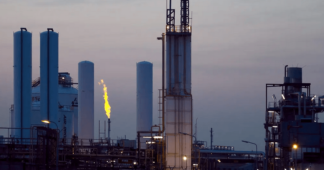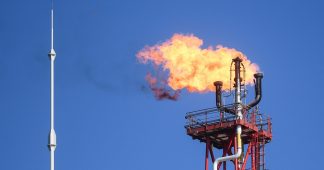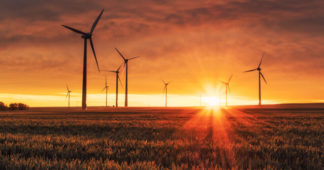The European Union is weighing major climate legislation to scale back emissions across the continent. But there’s a familiar foe mobilizing to scale back the legislation: lobbyists for corporate polluters.
By Cole Stangler
Jul 30, 2021
photo: Guilhem Vellut / Flickr
Earlier this month, the EU’s executive branch, the European Commission, finally rolled out a long-anticipated plan to meet its goal of reducing emissions by 55 percent by 2030 and reaching carbon neutrality by 2050 — offering up a mix of new taxes, stricter emissions standards, and stronger regulations. The sweeping set of proposals could have global repercussions: the EU is the third-largest economy in the world and the third-largest emitter of greenhouse gases after the United States and China, generating more than 7 percent of the planet’s total carbon emissions.
In many respects, though, the battle is just beginning. To take effect, the legislation needs approval from both European Parliament and what’s known as a “qualified majority” of national governments — at least fifteen of the EU’s twenty-seven member states that together represent at least 65 percent of Europe’s population. All in all, the labyrinthine negotiation process is expected to take around two years.
Many environmental groups already believe the plan on the table doesn’t go far enough. But as governments and legislators prepare to dig into its nearly four thousand pages worth of text, the EU’s climate package could get watered down even further over the coming months. Some of Europe’s most heavily polluting industries have already expressed opposition to key measures — and, unlike their counterparts from the environmental movement, they have extensive financial resources and formidable lobbying arms they can use to their advantage.
Extending Fuel Taxes
The International Air Transport Association (IATA), another industry group, was even more explicit about its opposition to lifting the loophole. On the day of the climate plan rollout, it fired off a press release topped with the headline “Tax is not the answer to aviation sustainability.”
Both are forces to be reckoned with in Brussels. According to publicly available disclosures, Airlines for Europe spent more than €1 million on efforts to lobby EU officials last year, while IATA spent more than €900,000 from 2019 to early 2020.
The groups’ individual members have also spent heavily to amass lobbying armies of their own. Airplane manufacturer Airbus spent more than €1.75 million on lobbying the EU in 2019, the year of its most recent available disclosures. Airline company Air France–KLM, meanwhile, doubled its spending on lobbying over the last year, forking out more than €900,000 as it successfully negotiated a whopping €10 billion bailout package from the French and Dutch governments that required a green light from the European Commission. German airline Lufthansa spent more than €300,000 on lobbying EU officials, while low-cost giant Ryanair shelled out more than €200,000, according to their most recent annual disclosures.
The EU’s climate plan would also see the maritime shipping sector lose its exemption from fuel duties — a measure that has already rankled the industry lobby. In a statement following the proposal’s release, the European Community Shipowners’ Associations argued that “removing the current tax exemption for fuel is not a consistent way forward.”
The group, which declared more than €500,000 in lobbying expenses in its most recent disclosures, said it was “looking forward to a close dialogue with EU policymakers to ensure that climate ambitions are met and that the competitiveness of European shipping is safeguarded.”
Expanding Cap and Trade
Some experts say such cap-and-trade programs are inadequate and vulnerable to political manipulation. But like the proposed kerosene tax, the airline industry has already expressed opposition to the measure.
According to information requests from corporate watchdog group Influence Map, both Air France–KLM and Lufthansa have criticized proposed extensions of carbon credits to the EU Commission. In one January 2021 email to EU commissioner Frans Timmermans, who heads European climate policy, Lufthansa argued that an expansion of emissions trading would “unilaterally affect costs for EU airlines.”
Europe’s fossil fuel industry is also wary of the proposal. FuelsEurope, the main lobby for oil and gas refiners — a group that includes BP, ExxonMobil, Shell, TotalEnergies, and Norwegian energy giant Equinor — has directly criticized the European Commission’s proposal to expand cap and trade. On its site, the lobby argues that “bringing road transport into [the emissions trading system] is unlikely to be effective” and calls instead for the creation of a separate “tailor-made” carbon market for auto transit.
FuelsEurope alone shelled out more than €3.25 million on lobbying the EU in 2020, about €1 million more than it did in 2019. Like in the United States, energy companies are some of the biggest overall spenders in European politics. BP, ExxonMobil, and Shell all rank among the top ten companies with the highest lobbying expenses in the EU. Each declared more than €3 million in annual lobbying fees, according to the most recent available data.
Natural gas suppliers are also powerful. Their lobby group Eurogas — which also includes some members of FuelsEurope — said it was opposed to an immediate extension of cap and trade, favoring instead a more gradual transition. In a position paper published in June, Eurogas, which spent more than €400,000 on lobbying in the year of its most recent disclosure, noted that “different sectors have different avoidance costs and their immediate inclusion into the existing [emissions trading system] without intermediary steps could initially risk increasing pressure on current [emissions trading system] sectors.”
Like other industries, the oil and gas lobbies claim to support the EU’s broader goal of achieving carbon neutrality by 2050. But as Myriam Douo, a campaigner with environmental group Friends of the Earth Europe points out, the sector’s own actions regularly undermine that promise.
One of the most brazen culprits, she says, is Royal Dutch Shell, headquartered in the Netherlands and incorporated in the UK. In addition to churning out nearly a billion barrels of oil and gas last year, Shell recently confirmed that it would appeal a decision from a Dutch court that would require it to cut carbon emissions more quickly.
“Would a company that really cares about climate change and is really committed to changing their activity appeal a decision that is forcing them to change their activity?” asks Douo. “There’s a huge gap between their discourse and what they actually do.”
Phasing Out Gasoline- and Diesel-Fueled Cars
While Europe’s auto industry has welcomed the turn to electric vehicles, which make up an ever-increasing share of sales, it’s far more reluctant to embrace a complete end to the sale of gasoline- and diesel-fueled cars. “Banning a single technology is not a rational way forward at this stage,” the European Automobile Manufacturers’ Association (ACEA) said in a statement after the release of the EU’s plan.
The ACEA spent more than €2.5 million on lobbying last year, and its leading members are heavy spenders of their own: Volkswagen ran up a €3 million lobbying tab in 2019; Daimler, which owns Mercedes, spent more than €2 million in 2020; BMW spent more than €1.25 million over that same stretch; and Toyota, which has led a global campaign to promote hydrogen-powered vehicles and resisted a full-on transition to electric cars, spent more than €400,000 from April 2020 to March 2021.
Lobbying at Home
As they pore over the plan’s thousands of pages worth of text, they’ll almost certainly hear from business lobbies. As InfluenceMap noted in a report earlier this month, cross-sector business lobbies in Europe’s largest economies — Germany, France, Italy, and Spain — have all expressed concerns about various aspects of the climate plan. Like the U.S. Chamber of Commerce, these national lobbies tend to defend the positions of their most polluting members in the name of industry at large, adopting what the watchdog dubbed a “lowest common denominator approach.”
More generally, industry’s official support for the EU’s reduction targets doesn’t quite line up with its opposition to the actual proposals on the table — a gap that will likely be on display as talks heat up over the coming months.
“It’s greenwashing,” says Douo from Friends of the Earth Europe. “They’re trying to present themselves as the ally on climate and it’s absolutely not true.”
While they also have criticisms of the EU’s climate plan and hope to see it evolve — albeit in a very different direction — green groups don’t come close to matching the influence of the fossil fuel lobby.
Faced with limited resources, Europe’s leading environmental NGOs recently formed a coalition of their own: the Green 10. In 2019, the group declared more than €25,000 in lobbying expenses — less than 1 percent of what FuelsEurope spent last year.
“We have to band together to gain that access, and then we get one meeting with ten organizations,” Douo says of the group’s outreach to the European Commission. “It’s completely different access; it’s nothing to be compared with what industry has.”
Published at jacobinmag.com
We remind our readers that publication of articles on our site does not mean that we agree with what is written. Our policy is to publish anything which we consider of interest, so as to assist our readers in forming their opinions. Sometimes we even publish articles with which we totally disagree, since we believe it is important for our readers to be informed on as wide a spectrum of views as possible.











